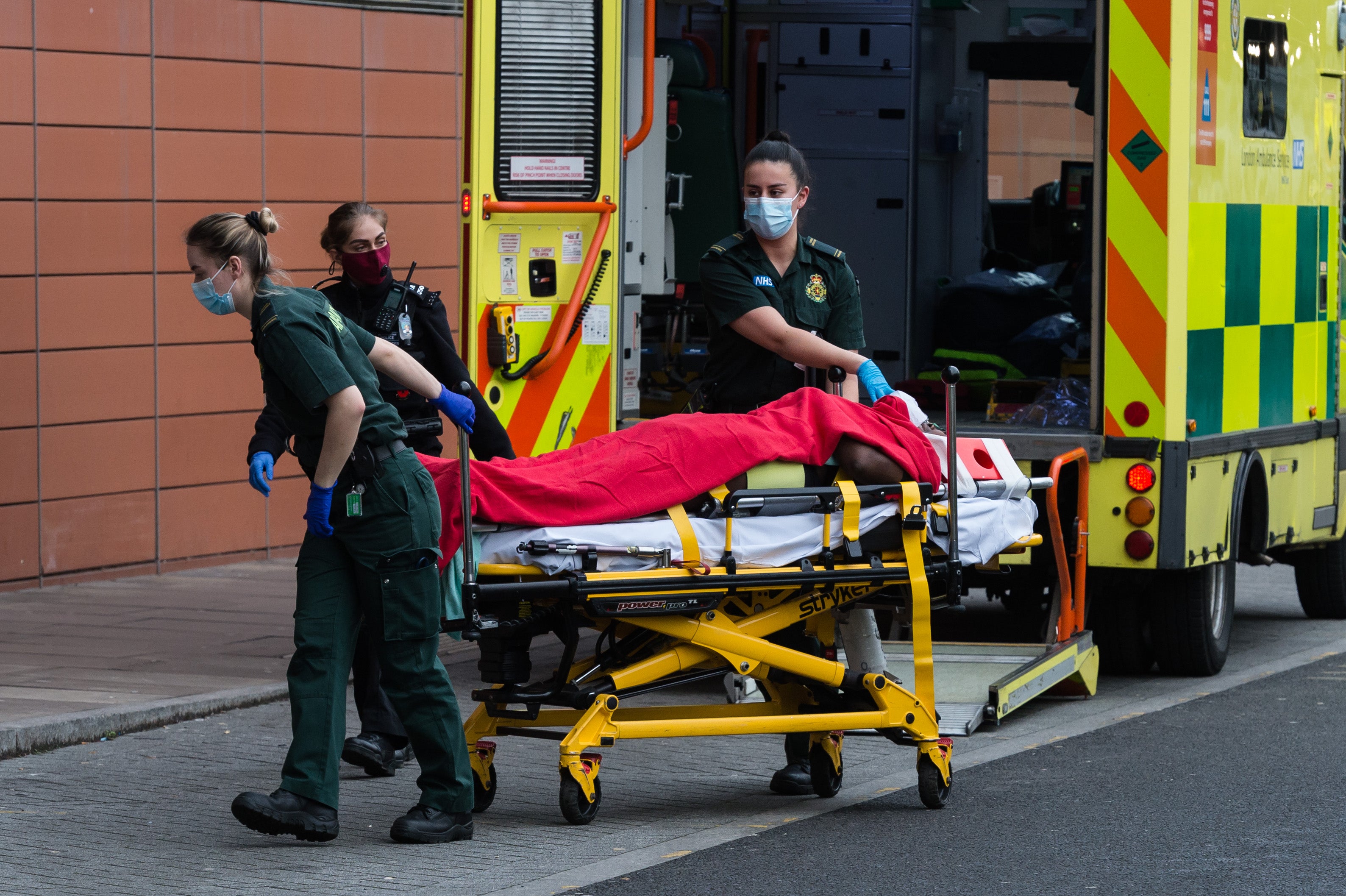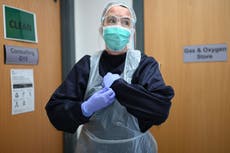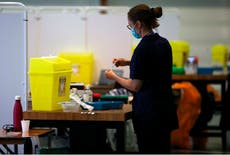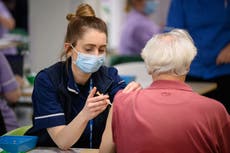‘I have never seen so many nurses cry during shifts’ – the mental health of NHS workers is on the brink
With rising Covid cases, limited resources and staff shortages, healthcare workers are being pushed to their limit – and yet all the warning signs were there


Your support helps us to tell the story
From reproductive rights to climate change to Big Tech, The Independent is on the ground when the story is developing. Whether it's investigating the financials of Elon Musk's pro-Trump PAC or producing our latest documentary, 'The A Word', which shines a light on the American women fighting for reproductive rights, we know how important it is to parse out the facts from the messaging.
At such a critical moment in US history, we need reporters on the ground. Your donation allows us to keep sending journalists to speak to both sides of the story.
The Independent is trusted by Americans across the entire political spectrum. And unlike many other quality news outlets, we choose not to lock Americans out of our reporting and analysis with paywalls. We believe quality journalism should be available to everyone, paid for by those who can afford it.
Your support makes all the difference.NHS staff are physically and emotionally exhausted. The Covid-19 pandemic has exposed a system plagued by staff shortages and inadequate funding – a system that has, for years, relied on goodwill.
The psychological burden of the pandemic on healthcare workers was predictable. The detrimental impact of other pandemics, such as Sars, on mental health of healthcare workers is well documented, with increased rates of depression, burnout, post-traumatic stress disorder (PTSD) and anxiety.
Combine this with high pre-existing rates of psychiatric, stress-related illnesses experienced by UK doctors, and suicide rates higher than many other occupations, and we have a perfect storm. There were early warning calls, with published data on the impact of Covid-19 on mental health of healthcare workers from China and Singapore. We were simply ill prepared.
With rising cases, limited resources and staff shortages, healthcare workers are being pushed to their limit. One senior nurse at a busy London emergency department said: “We were seven short this morning. Some are sick with Covid, some are isolating and some have been off for weeks for mental health reasons.
“Every day we are relying on the goodwill of colleagues to come in to do extra shifts,” she continued. “The extra support we had in the first wave, with free food, transport, and extra pay for additional shifts has been scrapped. Many of us are not from the UK, feel isolated and drained, and haven’t seen our families for eight or nine months. I have never seen so many nurses cry during shifts. Every shift is a struggle.”
Some healthcare workers have been forced to take prolonged sick leave for mental health reasons or have even resigned. “I have already been off long term for mental health reasons and I became so unwell, I attempted to take my own life,” another nurse said. “On my return, I’m being pushed to be redeployed. I was told I had a job to do and to get on with it. Many of us felt like lambs to the slaughter.”
A study of 2,707 healthcare workers identified several factors associated with staff burnout during the Covid-19 pandemic. These included: 1 - feeling pushed beyond training 2 - exposure to Covid-19 patients and 3 - making life-prioritising decisions.
As the current wave intensifies, many staff have been redeployed again to areas such as ICU, with limited experience and training, with increased exposure to Covid-19 patients, and senior staff increasingly having to make life-prioritising decisions, such as whether someone is suitable to be admitted to ICU and go on a ventilator. Staff are doing this day-in and day-out, for months. It is not difficult to understand why our workforce is burning out.
One senior nurse said: “I feel sorry for some of the junior staff. I remember I had to teach someone over the phone how to do non-invasive ventilation, as we didn’t have enough staff and I just couldn’t leave.
“When junior nurses ask for help and feel overwhelmed, sometimes they are left by themselves to get on with it, as there just isn’t enough support. After months of this, I was forced to take a period of sick leave as I couldn’t cope anymore and felt so guilty.”
The pandemic has also had a major impact on the training of doctors. Career-defining postgraduate exams have been cancelled or postponed, as have some speciality recruitment interviews, which trainees have dedicated months preparing for. The uncertainty, unpredictability and the detriment to their career pathway has also contributed to psychological distress and burnout.
“I had dedicated months revising for this exam, but I am not even sure if it will go ahead,” a trainee doctor said. “The uncertainty has caused me so much anxiety and stress; I don’t know what is going to happen.”
The support provided to staff during the first wave, such as free parking, food, accommodation, access to psychologists and wellbeing hubs, is no longer in place at most trusts, at a time when the staff need it the most. Our group’s ongoing research found that 37 per cent of healthcare workers in the UK reported drinking more during the pandemic as a coping mechanism. Moreover, many staff members who are working in some of the most high-risk areas in the hospital, such as ICU and A&E, have still not been allocated a vaccination slot.
Unable to access psychological support/therapy at her own trust, one anaesthetic doctor had to arrange therapy sessions privately. “In April last year, morale was high. But no one thought we would still be dealing with this and, frankly, everyone is somewhat reluctant and exhausted. I see the doctors being redeployed again are just despondent,” she said.
“Two beds are essentially crammed into one bed space, one nurse is looking after three or four ventilated patients, and there is no team spirit. The conditions are horrid. Shifts are hard, everyone is burnt out and the erratic days/nights schedule means there is little continuity with work colleagues. Camaraderie is dead.
“Really hard decisions are being made, due to limited resources. I remember an elderly patient who should have been intubated and transferred to ICU, but I was told by my consultant that he was not suitable for ICU. He subsequently, unfortunately, passed away. I have suffered from insomnia and am not able to switch off after shifts. I have also had flashbacks about patients”.
The goodwill of staff, on which the NHS has run on for many years, is running out. The Covid surge is likely to continue over the coming weeks and months. The government, key policy makers and local/national stakeholders must ensure that the mental health of staff is not neglected in the face of the rising Covid admissions and deaths, and that adequate support is in place to curb an impending mental health epidemic in the UK – the aftermath of which may see many staff members off on long-term sick leave or resigning completely.
Dr Ankur Khajuria is an NHS surgeon and lead researcher of the Royal College of Surgeons’ study of the impact of Covid-19 on mental health



Join our commenting forum
Join thought-provoking conversations, follow other Independent readers and see their replies
Comments